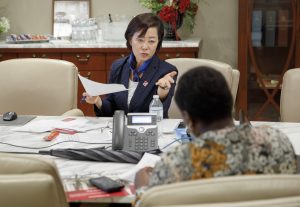
TUSCALOOSA, Ala. — The University of Alabama will soon begin addressing opioid-related morbidity and mortality in four Alabama counties by developing a community care network to strengthen prevention, treatment and recovery.
The Health Resources and Services Administration has awarded a UA-led team of researchers and community stakeholders a $200,000 grant to implement an integrative tele-health network.
The network will be used by a multidisciplinary team from UA with health and education community partners in Franklin, Marion, Winston and Walker counties.
Opioid abuse and misuse is a nationwide crisis. The U.S. Department for Health and Human Services estimated in 2017 that 130 people die each day from opioid-related overdoses and that 11.4 million people misused prescription opioids. The opioid crisis is magnified in Alabama, which has the nation’s highest per capita opioid prescription rate and saw 5,128 overdoses from 2006 through 2014.
The project, titled, “Development of an Integrated Care TeleECHO Model for Opioid Prevention, Treatment, and Recovery in Rural Alabama,” will improve prevention, treatment and recovery of substance use disorder and opioid use disorder by focusing on “whole-person care,” a community health concept that coordinates health, behavioral health and social services for more efficient and effective patient outcomes.
“Unfortunately, while there’s a really high risk of opioid-related mortality or morbidity in these counties, there are almost no facilities or programs specifically for opioid problems,” said Dr. Hee Yun Lee, principal investigator and UA professor of social work. “In this grant, we will identify the gaps and urgent needs of services or policies we must establish.”
The primary focus of the one-year grant is to assess various levels of care and support and to recommend changes for a three-year, $1 million implementation HRSA grant. Should researchers receive the next phase of funding, they’ll work with community partners to build-out services and direct-care improvements.
The “planning grant” sets the table for that stage, and though UA researchers aren’t providing new services over the next year, they’re enhancing existing services through TeleECHO, a relatively new care model that will allow existing providers to consult with experts, share their challenges and solutions, and expand behavioral health services in the four counties.
TeleECHO allows clinicians in the communities to use video and teleconferencing technology to connect with other care providers and researchers to discuss patient cases and better determine treatment. The model helps providers maintain a more efficient and effective care network in typically underserved areas.
This model helps better leverage existing partnerships in communities, including the Capstone Rural Health Center in Walker County, which will serve as the TeleEcho hub. The Capstone Rural Health Center is partnered with UA’s Capstone College of Nursing on a three-year HRSA grant to implement behavioral health services at its clinic.
“Existing services are scarce, but there are people there doing incredibly important work,” said Dr. Joshua Eyer, multi-principal investigator and assistant professor of nursing at UA. “TeleECHO is an affordable way to improve the expertise of the providers that are doing the work.”
Researchers point to another care concept – “non-judgmental” pathways to treatment – that will have tangible effects during the grant period. Eyer described the pathway as “treating the whole community,” as opioid misuse and abuse is a symptom of broader healthcare and financial problems that affect many people in those communities.
“In developing a culture that’s free of stigma, it will allow community members to freely help each other and come up with ideas for how to work together,” Lee said.
Contact
David Miller, UA Strategic Communications, 205-348-0825, david.c.miller@ua.edu
